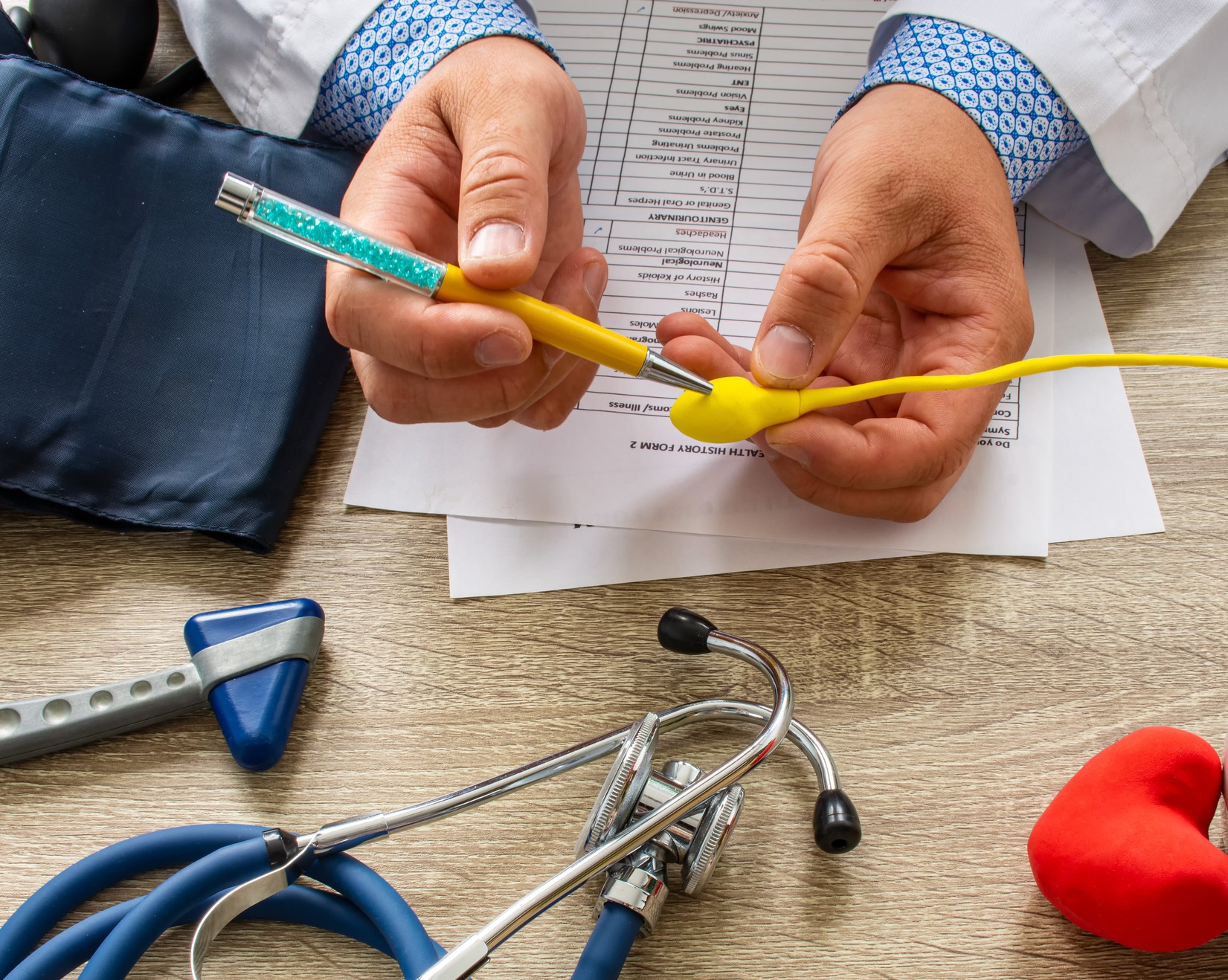-
How to Take Care of Yourself with a Newborn

Having a baby can turn your life upside-down. If you’re struggling to handle the heightened stress and fatigue of being a new parent, you’re not alone. Up to 80 percent of mothers experience “baby blues” during the first week or two after giving birth, and 15 percent develop more serious postpartum depression. Here are some practical tips to help you find time for yourself while also taking care of your newborn.
- Relax your standards: You’ve got more important things to worry about than deep cleaning and cooking gourmet meals. So let the dust collect. Fold the laundry tomorrow. Clean the bathroom with a quick swipe from a wet wipe. And serve peanut butter and jelly sandwiches or cereal for dinner.
- Get out of the house: If you’re going stir-crazy stuck at home, take the baby out for a walk. If possible, let someone you trust take the baby so you can run errands or get your hair done.
- Accept help: There’s no need to go it alone. If family members or friends offer to help, take them up on it! Ask them to hold the baby, fold the laundry, bring dinner over—whatever will help you the most.
- Adopt healthy habits: Resist the urge to count caffeine as a major food group. Instead, focus on eating healthy food, staying hydrated, and resting when you can. Nap when the baby naps, and work out a nighttime schedule with your partner that allows you both to maximize the amount of sleep you get.
- Set a schedule: Loosely plan how you’ll spend the morning, afternoon, and evening, designating a window of time to check items off your list. Be flexible and realistic so you can stick to your schedule most days.
- Develop a support network: Keep in touch with your parents, siblings, or friends who have also had babies recently. You might also join a support group where you can commiserate with other new parents.
- Nurture friendships: Just because you’re a new parent doesn’t mean your relationships have to fizzle out. Ask your partner or someone else you trust to watch the baby so you can go out for lunch with a friend.
- Maintain a sense of humor: Try to smile, even when things don’t go quite right. The spills, spit-up, and burst diapers are easier to handle if you can laugh it off.
- Keep some perspective: The newborn days won’t last forever. When you’re surrounded by chaos and almost at your wit’s end, remember that this too shall pass.
While parenting a newborn can be tough, it’s also the most rewarding thing you’ll ever do. If you’re ready to experience this for yourself, contact Dr. Joshua Green of the Center for Vasectomy Reversal about having your past vasectomy reversed. We are leaders in helping men become fathers through safe, effective medical intervention. To learn more about vasectomy reversal, please contact our Sarasota, FL clinic at 941-894-6428 or schedule a free consultation online.
-
What You Need to Know About Postpartum Depression

During pregnancy, you probably daydreamed about your baby’s arrival bringing happiness, pride, and love into your home. So if you’re feeling sad, hopeless, or depressed after giving birth, you may be confused, upset, or even guilty that your daydreams haven’t become a reality. It’s important to understand how common these feelings are and what treatments are available for postpartum depression (PPD).
Postpartum depression is not the same as “baby blues.”
Up to 80 percent of mothers experience “baby blues” during the first week or two after giving birth, which may cause mood swings, anxiety, crying, and difficulty sleeping. This is not the same as postpartum depression, which affects about 15 percent of mothers, whether they have other children or not. The intensity and long-lasting nature of postpartum depression can make it difficult to care for yourself and your baby.
Some symptoms of PPD include:
- Depression or severe mood swings
- Anxiety or panic attacks
- Excessive crying, irritability, or anger
- Difficulty bonding with the baby
- Fear of being a bad mother
- Withdrawing from social activities
- Trouble sleeping or sleeping too much
- Low energy
- Feeling guilty, shameful, or worthless
- Difficulty concentrating
- Thoughts of self-harm or hurting the baby
- Suicidal ideation
There are many risk factors for PPD.
Any mother can develop postpartum depression, but these factors may increase your risk:
- History of depression or other mood disorders
- Unwanted or difficult pregnancy
- Premature birth
- Having twins or triplets
- Recent stress, such as divorce, relationship issues, or death/illness of a loved one
- Serious health problems
- Lack of an emotional support network
- Drug or alcohol misuse
- Sleep deprivation
- Poor diet
Men can get postpartum depression, too.
Up to 25 percent of new dads experience depression after a baby is born, a condition known as paternal postpartum depression. Men with financial instability, relationship issues, a history of depression, or a partner with PPD are most at risk. If you’re a new father experiencing any of the symptoms listed above, contact your doctor for help.
Treatments are available for PPD.
If you notice signs of postpartum depression, treat it with these tips:
- Take antidepressants or other medication prescribed by your doctor.
- Seek counseling from a psychiatrist, psychologist, or other mental health professional.
- Practice self-care, such as eating well, exercising, meditating, and getting massages.
- Communicate with your partner about how they can help.
- Join a support group where you can commiserate with other new parents.
While postpartum depression and other pregnancy complications are always possible, you and your partner may have made up your minds about becoming parents. If you previously had a vasectomy, the first step is to have it reversed. Dr. Joshua Green of the Center for Vasectomy Reversal is a leader in helping men become fathers. To learn more about vasectomy reversal, please contact our Sarasota, FL clinic at 941-894-6428 or schedule a free consultation online.
-
How to Wean Your Baby off Breastfeeding

As your child grows older, the time will come to wean them off breastfeeding. Remember, weaning doesn’t need to be all or nothing. Even cutting back on the number of times you breastfeed each day is a step in the right direction. In fact, it’s usually best to wean your baby gradually, both for your own comfort and to help your baby adjust to the change. Use these tips to help ease the transition from breast to bottle.
When to Wean Your Baby off Breastfeeding
There is no set age when a child should stop breastfeeding. As long as both of you are still benefitting from it, you can breastfeed as long as you like. Many mothers choose to wean naturally, allowing the child to outgrow the need at their own pace. For many babies, this happens between nine and 12 months old, though some children continue to show interest well into their toddler years. Still, when and how you choose to wean is totally up to you.
Age-by-Age Guide to Weaning
Following age-appropriate guidelines can make the weaning process easier. Here are some tips to help guide you:
- How to wean at 0 to 3 months: Babies often wean more quickly at this age because they’re less aware of what’s going on around them. An easy method is to offer a bottle of breast milk at the start of each feeding and eventually replace nursing sessions with bottles.
- How to wean at 4 to 6 months: Start substituting bottles at your baby’s least favorite feeding session. If your attempts don’t work, see if a support person can get your baby to take a bottle. Sometimes it helps if you’re not in the room during feeding time.
- How to wean at 6 to 12 months: Solids are an option at this age, so begin offering baby food instead of nursing sessions. Experiment until you find something your baby really likes.
- How to wean a toddler: If your older child hasn’t lost interest in breastfeeding yet, it may be helpful to explain that big kids don’t nurse, and it’s time to be done. Other tips include changing up your routine, offering snacks and drinks, and distracting your child with activities and games.
Tips to Make Weaning Easier
- Offer bottles of pumped breast milk rather than formula, if possible.
- Pump milk as needed to prevent your breasts from becoming painfully engorged.
- Shorten and gradually reduce daily nursing sessions.
- Only nurse your child when they ask, a technique called “don’t offer, don’t refuse.”
- Get rid of the “nursing chair.”
If you and your partner are ready to have a baby, but you’ve had a vasectomy in the past, start your journey to parenthood by scheduling a vasectomy reversal consultation with Dr. Joshua Green. Our staff provides concierge-level care and friendly interactions to help our clients feel well cared for. To learn more, please contact the Center for Vasectomy Reversal in Sarasota, FL at 941-894-6428.
-
How to Soothe a Teething Child

Babies usually start teething between four and seven months old. If your baby has begun cutting those first few teeth, the experience may be unpleasant for both of you. Try these tips to soothe your baby’s aching gums safely and effectively.
- Offer a cold teething ring: Keep teething toys in the fridge or freezer so they’re ready to go when your child needs them. For safety reasons, choose solid plastic over gel-filled teethers, and inspect them after each use to ensure no parts are breaking off.
- Apply chilled items: Most babies love the feel of something cold on their sore gums, so keep a selection in your fridge or freezer at all times. Get creative with what you offer, from frozen washcloths to binkies to bottle nipples.
- Rub your baby’s gums: If your usual solutions aren’t available, try simply rubbing your child’s gums with your fingers (be sure to wash your hands first). If you’re at a restaurant, soak a few metal spoons in ice water and rotate them out to help your fussy baby.
- Offer frozen fruit: This option provides your child with a tasty, healthy treat. Try freezing bananas, mangos, or watermelon. Then, to prevent a choking hazard, place the frozen fruit in a mesh feeder before handing it over to your child.
- Get creative with mesh feeders: Fresh fruit isn’t the only thing you can place in a mesh feeder. Other ideas include peach or pear fruit cups, fruit pouches, ice cream, and yogurt. Freeze these items in ice cube trays so they’re a manageable size to place in a mesh feeder.
- Let your baby chew on everyday objects: Not every child likes having cold things in their mouth. If your baby refuses your frozen offerings, try giving them a toothbrush, wooden spoon, or clean cloth diaper or burp rag to suck on. Just be sure to monitor your child to prevent the risk of choking.
- Cuddle with your baby: Sometimes, extra cuddle time with Mom or Dad is the biggest comfort for a teething baby. Sit in a comfortable chair, hold your baby close, and sing songs or read stories together to distract them from the pain.
- Ask your pediatrician about medication: If you find your other soothing methods ineffective, medicine may be an option. Ask your child’s doctor for recommendations and to confirm the dosage. Also, be aware that some teething tablets contain belladonna, and numbing gels may contain benzocaine. The FDA has linked these substances with dangerous side effects in babies, so you should avoid them.
Are you and your partner talking about having a baby? Even if you’ve had a vasectomy, parenthood may still be in the cards. Start your journey by scheduling a vasectomy reversal consultation with Dr. Joshua Green. Over the years, Dr. Green has helped hundreds of men become fathers who would have otherwise been unable to. For more information, please contact the Center for Vasectomy Reversal in Sarasota, FL at 941-894-6428.
-
How Stress Affects Semen Quality

It’s long been understood that stress has an impact on a person’s health, so it comes as no surprise to learn that men’s reproductive health may be affected by stress. About 12 in every 100 couples in the United States struggles with infertility, and several studies over the past several years have established a link between poor semen quality and stress. Now, a new study is taking a closer look at both subjective and objective measures of stress to try to determine how it’s connected with semen concentration and sperm motility and appearance.
Male infertility is the problem for about 40 percent of couples with fertility issues. The main cause of male infertility is sperm abnormality, including misshapen or immobile sperm or low sperm production. Sometimes, these abnormalities are caused by medical conditions, but they can also be caused by health and lifestyle factors.
The new study, published in the journal Fertility and Sterility was conducted by researchers from the Rutgers School of Public Health in Piscataway, NJ and Columbia University’s Mailman School of Public Health in New York, NY. Between 2005 and 2008, researchers looked at 193 men between the ages of 38 to 49 who were a part of the Study of the Environment and Reproduction at the Kaiser Foundation Health Plan in Oakland, CA. The men completed a series of tests to measure stress levels, including workplace stress, stressful life events, and perceived stress. They also provided sperm samples, which were analyzed for semen concentration, sperm shape, and sperm movement (motility).
According to the researchers, men who felt stressed had lower concentrations of sperm and more sperm that were misshapen or had impaired motility. Even after considering other factors, like a history of reproductive health or other health problems, life stress negatively impacted sperm quality. Interestingly, job stress did not have the same effect. However, men with stressful jobs had lower levels of testosterone, and unemployed men had a lower quality of sperm than even stressed-out men with jobs.
The researchers don’t fully understand how stress affects semen quality, but they have some theories. It could be that stress triggers the release of glucocorticoids, steroid hormones which lower testosterone and dampen sperm production. Oxidative stress could also be a factor because oxidative stress in the body can degrade semen quality.
What is known is that a man can improve his fertility, even under stress, with healthy lifestyle habits. Staying physically active and practicing stress-reducing relaxation techniques can help, as can eating a nutritious diet and maintaining a healthy BMI. Men who are trying to improve their fertility should quit smoking, limit alcohol consumption, and talk to a doctor before beginning any new medication.
At the Center for Vasectomy Reversal, we pride ourselves on helping men improve their fertility through uncompromising, concierge-level patient care. Under the direction of Dr. Joshua Green, our team provides state-of-the-art treatment for men who need a reversal of their vasectomy or have other fertility concerns. To learn more, contact us through our website or call 941-894-6428.
-
How Vasectomy Reversal Procedures are Performed

Vasectomies are a common procedure for couples who have completed their families, in part because they’re a simpler procedure than a tubal ligation. Sometimes, however, men change their minds after they’ve had a vasectomy. It could be that the couple decides they want another child, or gets a divorce, but whatever the reason, it’s now possible for men to have their vasectomies successfully reversed. Vasectomy reversal, however, is a more complicated process.
The most common procedure to reverse a vasectomy is the vasovasostomy. This is a surgical reconnection of the vas deferens, the tube that carries sperm away from the testes. Generally, there’s a vas deferens on each side of the body, about the diameter of a strand of spaghetti, and these tubes are divided when a vasectomy is performed. Sperm production doesn’t stop after a vasectomy, but the sperm are no longer able to leave the body. A vasovasostomy allows ejaculation to occur again.
To perform a vasovasostomy, the surgeon makes a small incision in the scrotum. The vas deferens is isolated and dissected microscopically, divided above and below the obstruction caused by the vasectomy. The fluid from the testicle side is examined, and if it contains sperm, the surgeon reconnects the two ends of the vas deferens. This is done using multiple layers of micro suture and a powerful surgical microscope that magnifies the vas deferens to about 40 times its size. Once the vas is placed back into the normal position, a small drain is inserted in each side and the incision is closed with absorbable suture. The drains are removed the next day.
If there’s no sperm present in the fluid, the issue could be scar tissue that’s blocking the flow of sperm. If that’s the case, the surgeon may have to perform a more complicated procedure, called a vasoepididymostomy. There’s no way to know before surgery which procedure will be needed, so it’s important to find a surgeon capable of performing both. A vasoepididymostomy involves connecting the vas deferens to the epididymis. The longer it’s been since the vasectomy, the higher the possibility that a vasoepididymostomy will need to be performed.
The chances of a vasectomy reversal being successful are fairly high. If the vasectomy happened less than five years ago, there’s a greater than 95 percent chance that the ejaculate will contain sperm. Between five and ten years, it drops to about 90 percent, but even after ten years, the success rate is still between 80 and 90 percent. The chances of a successful pregnancy depend on several different factors, but with the help of a competent surgeon, many fertility issues can be overcome.
At the Center for Vasectomy Reversal, we pride ourselves on providing optimal surgical results and uncompromising, concierge-level patient care. Under the direction of Dr. Joshua Green, our team provides state-of-the-art treatment for men who need a reversal of their vasectomy or have other fertility concerns. To learn more, contact us through our website or call 941-894-6428 for a free consultation.
-
Parenting Styles

What’s your parenting style? There’s no doubt that parenting styles have an impact on a child’s behavior. And while parents are all different, researchers have narrowed parenting styles down to four different general types: authoritarian, authoritative, permissive, and uninvolved. These styles can be largely defined by how demanding the parent is, and how responsive.
- Authoritarian parents believe in strictly controlling their kids. Their children must follow rules without exception, and disobedience is punished. This style of parenting involves high demand from the parents, and low responsiveness to the children’s needs. Authoritarian parents have a “because I said so” approach, perceive negotiation by the child as backtalk, and justify harsh punishments like corporal punishment as “tough love.” Because authoritarian parents don’t involve their kids in problem solving or value their opinions, their children tend to be insecure and have trouble negotiating challenges. They often learn to lie effectively so that they avoid being punished.
- Authoritative parents have a high level of demandingness, but also a high level of responsiveness. Like authoritarian parents, they set clear rules and guidelines. Authoritative parents, however, are far more democratic. They believe in reasoning with kids, having open dialogue and providing guidance. While they have high expectations, they’re also warm and supportive, using disciplinary methods intended to help their children become not only cooperative, but also self-regulated. They offer their children autonomy and independence, and they allow bidirectional communication. This is considered the most effective form of parenting by most experts, because the children of authoritative parents develop independence, good self-esteem, self-control, and self-regulation, and tend to flourish under their parents’ affectionate support.
- Permissive parents ask very little of their children. They may set rules, but they rarely enforce them, and tend to have a “kids will be kids” attitude. Often, permissive parents only step in when there’s a serious problem, and often take more of a friend role than that of a parent. While they encourage their children to talk to them about their problems, they don’t offer much guidance when it comes to poor choices and bad behavior. Permissive parents tend to be warm and indulgent, but because their children are largely self-regulated, they often grow up to struggle in relationships, have trouble following rules, and suffer from health problems.
- Uninvolved parents are neither demanding nor responsive. They may not mean to be neglectful: they may be overwhelmed with their own struggles or have very little knowledge about parenting. They don’t set boundaries, offer guidance, or provide support, and as a result their children often grow up to struggle with mental health issues and addiction. They tend to have low self-esteem, be unable to self-regulate, and behave more impulsively.
At the Center for Vasectomy Reversal, we love helping people become parents! We pride ourselves on providing optimal surgical results and uncompromising, concierge-level patient care. Under the direction of Dr. Joshua Green, our team provides state-of-the-art treatment for men who need a reversal of their vasectomy or have other fertility concerns. To learn more, call 941-894-
-
How to Know if Being a Dad is Right for You

Are you ready to be a father? Fatherhood is an immense responsibility, so its no surprise that men sometimes have a hard time determining whether they’re up to the challenge. Further, while being a dad has its rewards, there’s no shame in recognizing that it’s not for you. If the idea of becoming a father makes you uneasy, it’s time to ask yourself whether it’s just a case of nerves or you’re really not cut out for it. How can you tell? Reflect on these questions.
- How do you feel about kids in general? If playing with children seems boring, and kids seem too messy and noisy, you might not want to bring any into your life. Even the nicest, best behaved kids are disruptive to a quiet, tidy life. They make messes, get sick, throw tantrums, and generally leave chaos in their wake.
- When you imagine your future, are there children in the picture? If your dreams are more adventurous than domestic, or you want to pursue expensive, time-consuming hobbies, kids might not be the best option. Once you have kids, children, you’ll have to make sacrifices and put their needs ahead of your own; not everyone is willing to do that.
- Thinking about the guidance kids need, do you think you’d be up to it? If you think you’d make a poor role model, and you like playing with kids but not teaching them, parenting probably isn’t for you. Raising a child to be a responsible, independent adult is a lengthy, difficult process.
- Does your career leave time for a family? It’s important to be financially stable before you bring a child into the world, because kids are expensive. That being said, being a dad requires putting in a good deal of face time and getting to know this new person. A job that requires tons of travel or excessively long hours isn’t the best fit for a father.
Remember, having kids is optional, but it’s also not a decision you have to make once and for all. Some signs you might be warming up to the idea include:
- The idea of guiding children begins to appeal to you, and you feel like you could tackle this task with even a challenging child.
- You’re financially secure enough to afford kids, have a schedule that will let you spend time with them, and have a support system in place to help.
- Spending time with kids appeals to you.
- You are comfortable with mess, clutter, and general chaos.
If you’re ready to be a dad, the Center for Vasectomy Reversal is ready to help you build your family! We pride ourselves on providing optimal surgical results and uncompromising, concierge-level patient care. Under the direction of Dr. Joshua Green, our team provides state-of-the-art treatment for men who need a reversal of their vasectomy or have other fertility concerns. To learn more, call 941-894-6428 or contact us through our website.
-
Fun Things to Do Around Sarasota with Your Kids this Summer

Are you headed to the Gulf coast of Florida with your family this summer? Don’t miss out on all that Sarasota has to offer. Here, we offer some suggestions of fun things to do.
- Check out some marine life. The Mote Marine Laboratory and Aquarium is both fun and educational, with all sorts of exhibits from coral reefs to sea jellies to river otter and alligators. You’ll enjoy seeing manatees and sea turtles, but the really exciting event happens Mondays, Wednesdays, and Fridays at 11am, when the trainers feed the 135,000 gallon tankful of sharks.
- Have a jungle adventure. Sarasota Jungle Gardens, a family-owned local zoo, has 200 species, including parrots, snakes, lemurs, and alligators. Big Cat Habitat is an animal sanctuary that focuses on housing big cats like tigers and lions but also has non-cat species like bears, monkeys, sloths, foxes, wallabies, and more.
- Do some science. The Suncoast Science Center has a state-of-the-art lab with classes that allow school-aged kids to do experiments they wouldn’t otherwise be able to do. The state-of-the-art equipment in the lab can help them with experiments that they wouldn’t be able to do at home.
- Stroll through a garden. The Marie Selby Botanical Gardens cover 15 acres in the former home of Marie and William Selby. Added to the National Register of Historic Places in 1998, it’s got beautiful displays of vibrant flowers in exhibits like the Orchid Show, the Tropical Conservatory, or the Children’s Rainforest Garden.
- Visit a park. There are plenty of parks from which to choose in Sarasota, so pick one and have a ball with your family! Urfer Park has a playground, fitness equipment, hiking and biking trails and, if you go far enough in, wetlands and cows. Oscar Scherer State Park features hiking, camping, picnicking, rollerblading, snorkeling, paddling, and more. Myakka River State Park is one of the largest parks in Florida, and offers camping, bird watching, horseback riding, and wildlife viewing.
- Visit a circus museum. Sarasota used to be the winter home of the Ringling Brothers Barnum and Bailey Circus. Today, The Ringling is the official state art museum of Florida, with extensive grounds and a vast collection of artworks. There’s also the Circus Museum, where your kids will love exploring a collection that includes performer wardrobes, props wagons, and more.
- Walk through the trees. Have a fun adventure with your kids at TreeUmph, an elevated outdoor park nearby, in Bradenton. Swinging around in the park’s aerial courses, you’ll cross suspended bridges and do zip line courses with crazy obstacles.
At the Center for Vasectomy Reversal, we love families, and we love helping people build their families! We pride ourselves on providing optimal surgical results and uncompromising, concierge-level patient care. Under the direction of Dr. Joshua Green, our team provides state-of-the-art treatment for men who need a reversal of their vasectomy or have other fertility concerns. To learn more, call 941-894-6428 or contact us through our website.
-
How to Increase Male Fertility

If you and your partner are struggling to conceive a child, you’re not alone. About one in six couples struggles with infertility, and one in three cases is due to a problem with male fertility. There are some natural remedies you can try, though, that may boost your chances of conception.
- Load up your diet with healthy foods. Eat plenty of fruits and vegetables, focus on getting antioxidants and healthy fats. Limit your intake of saturated fats and red or processed meat. And be careful about eating soy, because it contains plant estrogen, which can reduce testosterone bonding and sperm production.
- Take your vitamins and minerals. Though the mechanism behind it is not completely understood, research indicates that vitamin D and calcium can impact sperm health. Vitamin C improves fertility by relieving oxidative stress in the body. Additionally, limited studies suggest folate and zinc can improve sperm concentration, count, and overall health.
- Quit smoking. Smoking is bad for every part of the body, so it should come as no surprise that it’s bad for your fertility. In fact, recent research indicates that smoking consistently reduces sperm count and people who smoked moderate or heavy amounts of tobacco had lower sperm quality than non-smokers or even light smokers.
- Watch the alcohol and drugs. Don’t drink to excess, don’t do any illegal drugs, and be mindful of your prescriptions. Some antibiotics, anti-androgens, anti-inflammatories, antipsychotics, opiates, antidepressants, anabolic steroids, supplementary testosterone, and methadone can all negatively affect your fertility. If you’re concerned about a medication you’re taking, talk to your doctor.
- Keep your cool. High temperatures can damage sperm, so if you’re trying to conceive don’t hold your laptop in your lap, wear tight underwear, or soak in hot tubs. Prolonged sitting and using car seat heaters can also cause overheating.
- Consider a supplement. Certain herbal supplements may be beneficial to fertility, including fenugreek, maca root, tribulus terrestris, and Indian ginseng. D-aspartic acid, a type of amino acid, may also be helpful.
- Reduce your exposure to environmental contaminants. Poor air quality and environmental toxins have been shown to decrease male fertility. Additionally, men in jobs with exposure to chemicals and overheating, like farmers, painters, varnishers, metalworkers, and welders, had higher incidences of infertility than other groups.
- Manage your stress. Stress raises cortisol levels, and cortisol lowers testosterone.
- Get some exercise and some sleep. For each, the key is to get just the right amount- not too little and not too much. Getting enough exercise and enough rest can improve your sperm count. It can also help you lose weight, which can improve your fertility.
If you’re struggling with infertility, call the Center for Vasectomy Reversal, where we love helping people build their families! We pride ourselves on providing optimal surgical results and uncompromising, concierge-level patient care. Under the direction of Dr. Joshua Green, our team provides state-of-the-art treatment for men who need a reversal of their vasectomy or have other fertility concerns. To learn more, call 941-894-6428 or contact us through our website.
Recent Posts
Popular Posts
categories
- Uncategorized
- Sperm Retrieval
- vasectomy reversal
- Emergency
- Dr. Green
- sperm count
- fertility
- male infertility
- MESA
- medical care
- low sperm count
- IVF
- male fertility testing
- anesthesia
- pregnancy
- sperm aspiration
- semen analysis
- post-vasectomy pain syndrome
- infertility
- VE
- anti-sperm antibodies
- older dad
- general anesthesia
- gender reveal party
- post-operative infections
- baby name
- parent
- baby's first year
- fertilization process
- spinal anesthesia
- ACS Fellow
- nutrition tips
- concierge-level care
- fertility planning app
- azoospermia
- out-of-town patients
- V-V
- post-vasectomy reversal
- conceiving
- vasectomy
- vasoepididymostomy
- smoking
- sperm quality
- baby registry
- infographic
- surgical care
- surgical consultation process
- prostate cancer
- baby gender
- family time
- COVID
- Baby Shower
- Child Care
- Halloween Costume Ideas for Babies
- Halloween
- Halloween Safety Tips
- Celebrity Infertility Spotlight
- Postpartum
- testosterone
- Father's Day
- Father
- Men's Health
- Thanksgiving
- Pregnancy Announcement
- Parenting Tips
- Sperm
